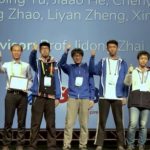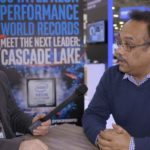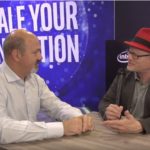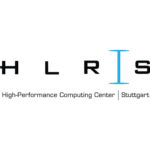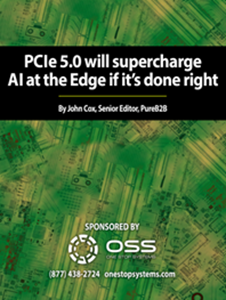In this video from SC18 in Dallas, Dr. Sofia Vallecorsa from CERN OpenLab describes how Ai is being used in design of experiments for the Large Hadron Collider. “An award-winning effort at CERN has demonstrated potential to significantly change how the physics based modeling and simulation communities view machine learning. The CERN team demonstrated that AI-based models have the potential to act as orders-of-magnitude-faster replacements for computationally expensive tasks in simulation, while maintaining a remarkable level of accuracy.”
The Green HPCG List and the Road to Exascale
In this special guest post, Axel Huebl looks at the TOP500 and HPCG with an eye on power efficiency trends to watch on the road to Exascale. “This post will focus one efficiency, in terms of performance per Watt, simply because system power envelope is a major constrain for upcoming Exascale systems. With the great numbers from TOP500, we try to extend theoretical estimates from theoretical Flop/Ws of individual compute hardware to system scale.”
Video: China’s Tsinhua University Takes the Student Cluster Competition
In this video from CGTN, China’s Tsinghua University takes the Student Cluster Competition at the SC18 conference in Dallas. The win was the final step in a Triple Crown for the team, as they won similar competitions in Asia and Germany earlier this year. “With sponsorship from hardware and software vendor partners, student teams design and build small clusters, learn designated scientific applications, apply optimization techniques for their chosen architectures, and compete in a non-stop, 48-hour challenge at the SC conference to complete a real-world scientific workload, showing off their HPC knowledge for conference attendees and judges.”
Intel Offers Sneak Peek at Cascade Lake Advanced Performance edition for HPC
In this video from SC18 in Dallas, Thor Sewell from Intel describes the company’s pending Cascade Lake Advanced Performance chip. “This next-gen platform doubles the cores per socket from an Intel system by joining a number of Cascade Lake Xeon dies together on a single package with the blue team’s Ultra Path Interconnect, or UPI. Intel will allow Cascade Lake-AP servers to employ up to two-socket (2S) topologies, for as many as 96 cores per server.”
Video: Intel Driving HPC on the Road to Exascale
In this video from SC18, Raj Hazra describes how Intel is driving the convergence of HPC and Ai. “To meet the new computational challenges presented by this AI and HPC convergence, HPC is expanding beyond its traditional role of modeling and simulation to encompass visualization, analytics, and machine learning. Intel scientists and engineers will be available to discuss how to implement AI capabilities into your current HPC environments and demo how new, more powerful HPC platforms can be applied to meet your computational needs now and in the future.”
Indiana University Demonstrates World’s First Single-Channel 400G Network
Indiana University staff and faculty will build the world’s first single-channel 400-gigabit-per-second-capable network for research and education at SC18. The connection will be capable of transmitting 50 gigabytes of data every second—or, enough to stream 16,000 ultra-high-definition movie. The demonstration, “Wide area workflows at 400 Gbps,” is IU’s submission to the conference’s annual Network Research Exhibition, which spotlights innovation in emerging network hardware, protocols, and advanced network-intensive scientific applications.
How Intel is Fostering HPC in the Cloud
“Cloud computing offers a potential solution by allowing people to create and access computing resources on demand. Yet meeting the complex software demands of an HPC application can be quite challenging in a cloud environment. In addition, running HPC workloads on virtualized infrastructure may result in unacceptable performance penalties for some workloads. Because of these issues, relatively few organizations have run production HPC work- loads in either private or public clouds.”
Intel Continues HPC Leadership at SC18
In this video from SC18 in Dallas, Trish Damkroger describes how Intel is pushing the limits of HPC and Machine Learning with a full suite of Hardware, Software, and Cloud technologies. ”
Today’s high performance computers are unleashing discovery and insights at an unprecedented pace. The intersection of artificial intelligence and HPC has the potential to transform industries from life sciences to manufacturing, while solving some of the toughest challenges in our world. At SC18, HPC users got to experience how Intel’s holistic portfolio of products is transforming HPC from traditional modeling and simulation to visualization, analytics, and artificial intelligence.”
HPE to build Hawk Supercomputer for HLRS in Germany
Today HLRS in Germany announced plans to deploy next-generation supercomputer for HLRS, 3.5 times faster than its current system. The upcoming system, which HLRS has named Hawk, will be the world’s fastest supercomputer for industrial production, powering computational engineering and research across science and industrial fields to advance applications in energy, climate, mobility, and health.
How Intel is Driving the Convergence of HPC & Ai
“The emerging AI community on HPC infrastructure is critical to achieving the vision of AI,” said Pradeep Dubey, Intel Fellow. “Machines that don’t just crunch numbers, but help us make better and more informed complex decisions. Scalability is the key to AI-HPC so scientists can address the big compute, big data challenges facing them and to make sense from the wealth of measured and modeled or simulated data that is now available to them.”



